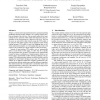Free Online Productivity Tools
i2Speak
i2Symbol
i2OCR
iTex2Img
iWeb2Print
iWeb2Shot
i2Type
iPdf2Split
iPdf2Merge
i2Bopomofo
i2Arabic
i2Style
i2Image
i2PDF
iLatex2Rtf
Sci2ools
125
click to vote
CGO
2010
IEEE
2010
IEEE
Automatic creation of tile size selection models
Tiling is a widely used loop transformation for exposing/exploiting parallelism and data locality. Effective use of tiling requires selection and tuning of the tile sizes. This is usually achieved by handcrafting tile size selection (TSS) models that characterize the performance of the tiled program as a function of tile sizes. The best tile sizes are selected by either directly using the TSS model or by using the TSS model together with an empirical search. Handcrafting accurate TSS models is hard, and adapting them to different architecture/compiler, or even keeping them up-to-date with respect to the evolution of a single compiler is often just as hard. Instead of hand-crafting TSS models, can we automatically learn or create them? In this paper, we show that for a specific class of programs fairly accurate TSS models can be automatically created by using a combination of simple program features, synthetic kernels, and standard machine learning techniques. The automatic TSS model ...
Related Content
| Added | 16 May 2010 |
| Updated | 16 May 2010 |
| Type | Conference |
| Year | 2010 |
| Where | CGO |
| Authors | Tomofumi Yuki, Lakshminarayanan Renganarayanan, Sanjay V. Rajopadhye, Charles Anderson, Alexandre E. Eichenberger, Kevin O'Brien |
Comments (0)

